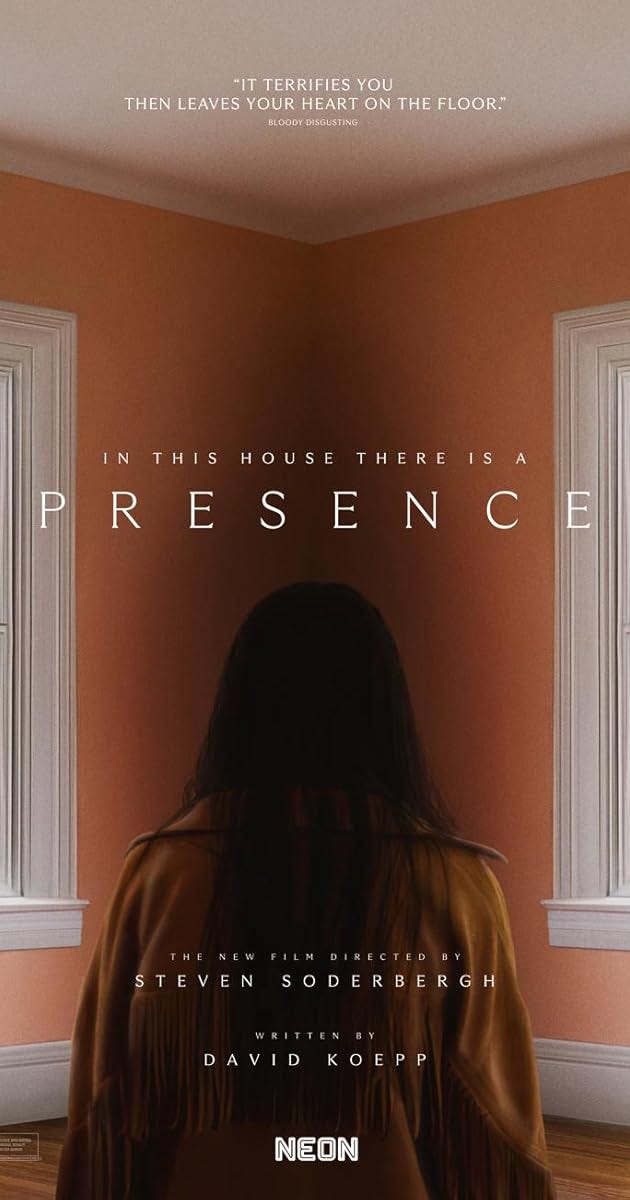Review: Presence is a Dull Ghost Story Built on an Interesting But Failed Gimmick
Steven Soderbergh’s suspense is a great concept but builds to nothing
(This review contains spoilers for Suspense.)
If any filmmaker exists to demonstrate the ethos of “one for you, one for me”, it’s Steven Soderbergh. While the Oscar and Palme d’Or winner has plenty of commercial hits to his name, he has just as many experimental oddities. He can bring the A-List game for an Erin Brockovich or Ocean’s Eleven then move into serious adult fare like Che then get weird with a Bubble or Schizopolis. There aren’t a lot of directors working today who swing so wildly between genres, styles, and budgets, and do so in such a prolific manner (I would argue his closest compatriot is Michael Winterbottom, but he was never putting out box office hits in the same way.)
With his artistic freedom and eagerness to never do the same thing twice comes, expectedly, an erratic filmography in terms of quality. But generally speaking, I'm never bored with a Soderbergh film. There's always something to talk about, think about, or be enthralled/aggravated by. When you make Sex, Lies, and Videotape at the age of 26, you can basically do whatever you want. So, it brings me no joy to admit that not only did I not like Presence, but I was indeed very bored by it.
(Image via Neon.)
This is a ghost story from the perspective of the ghost. An unnamed and unseen spirit occupies the house that a new family has moved into. Rebecca (Lucy Liu) is a workaholic matriarch who prefers her son to her daughter. Chris (Chris Sullivan) is concerned about the state of his marriage and his wife's dodgy dealings. Tyler (Eddy Maday) is an arrogant jock who will do anything to stay at the top of the social ladder. Chloe (Callina Liang) is struggling with the death of her best friend Nadia, an issue nobody in the family wants to deal with.
The ghost is our point-of-view, moving swiftly and silently around the house to eavesdrop on conversations and survey the disintegrating state of this family. Soderbergh, ever the renaissance man, is his own cinematographer and ensures that the Steadicam is uncanny in its movements for the right moments. Other times, you can sense the former human being behind the spirit, tentatively sneaking into corners of bedrooms or backing away when one of the living feels that undeniable presence. It’s a great idea, one whose appeal is understandable for an experimenter like Soderbergh. But it never evolves beyond feeling like a gimmick, and that leaves the whole film adrift.
It's tough to create tension with this format. Yeah, it’s kind of spooky to think about what it’d be like to stare a ghost in the “eye” and not know it but that idea loses its lustre very quickly in this short movie (it’s under 90 minutes.) It becomes repetitive and doesn’t have any real emotion or anxiety to keep it afloat. Voyeurism is paramount to horror and the viewer’s own status as the voyeur is part of the titillation. Breaking the fourth wall on that, so to speak, punctures a lot of the heft. It ends up being more distancing than intimate.
And that distance extends to the characters. We get glimpses of the quartet’s problems from this perspective, which could have offered a puzzle-like narrative for the viewer to put together. Rebecca is committing financial fraud and falling apart in her desperation to cover it up. Chris wonders if he can get out of the marriage to save his own skin. Everyone in this family is desperately lonely, and we see their isolation through a force even more alone. Yet this potential mystery is let down by the script. Rebecca’s troubles are quickly swept away in the third act. A psychic is brought in for some exposition. Then it all builds up a climax involving a potential rapist who monologues like a Bond villain to pad out the plot and offer a supposed twist. Oh yeah, it’s yet another horror movie with an attempted sexual assault subplot. Because that’s what this decade of filmmaking needed more of. It’s a disheartening descend into lazy cliché for a filmmaker who is usually so good at avoiding such pitfalls.
(Image via Neon.)
Presence never escapes the sense that it’s a neat technical gimmick and nothing more. I imagine this was interesting to produce, with Soderbergh showing how modern cameras can be used to intriguing effect. We don’t see many films with a first-person perspective and there’s a reason for that. Nickel Boys, another example of this, worked far better because that forced you into the eyes of the lead character and his struggles in a way that was morally urgent but also aesthetically elegant. It simply felt far more substantive than what Presence offers. The script here is too lightweight and takes the easy way out narratively, so all you have is 85 minutes to think about how good the camera work is and how Lucy Liu really deserves better roles (no, seriously, someone get Lucy Liu a director who knows what to do with her. Lee Isaac Chung, Marielle Heller, Lulu Wang… where are you all?!)
Presence is in UK and US theatres now.






Agree! Such a fun and compelling concept, but didn’t land it. It really felt like a group of artists had a filmmaking retreat and on Sunday they said, “I think we’ve got something! Let’s get it out by the end of the month!”